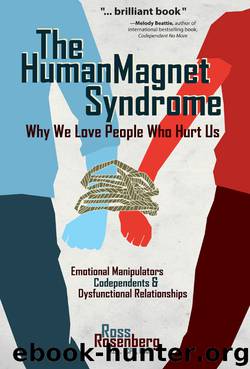The Human Magnet Syndrome: Why We Love People Who Hurt Us by Ross A. Rosenberg

Author:Ross A. Rosenberg
Language: eng
Format: epub
Tags: The Human Magnet Syndrome: Why We Love People Who Hurt Us
Publisher: PESI Publishing & Media
Published: 2013-08-19T04:00:00+00:00
11 “The Great Pretender” by Buck Ram; Copyright © 1955 by Panther Music Corporation; Copyright Renewed. Used by Permission of Peer International Corporation
CHAPTER 9
The Origins of Emotional Manipulation Disorders
Children who are raised by healthy and nurturing parents in a safe and secure environment will likely become psychologically healthy adults who experience healthy mutual and reciprocal adult relationships. As explained in the previous chapter, in severely dysfunctional families, children often replicate their parents’ psychopathology. Moreover, children carry forward dysfunctional elements of their family of origin into their own relationships or families. As mentioned in the preceding chapter, children of an emotional manipulator parent, who may be partnered with a codependent parent, ultimately repeat the “sins” of their parents, following in their dysfunctional footsteps. In other words, emotional manipulator parents create psychologically damaged children, e.g., codependents (as demonstrated in the last chapter) or emotional manipulators. The deciding factor on which side of the continuum of self the child will find himself is directly influenced by the manner in which he coped and adapted to the emotional manipulator parent. If the child was able to adapt by becoming the gifted or pleasing child, then they will likely become a codependent. And if they could not or were unable to please their parent, they are destined to a harsher and more disturbed future – becoming an emotional manipulator. As they say, “the apple doesn’t fall far from the tree.” However, in the case of children from emotional manipulator parents, we should ask on which side of the tree does the apple fall?
There are typically two potential outcomes for children raised by emotional manipulators. As illustrated in the preceding chapter, The Origins of Codependency, a child who adapted to their emotional manipulator parent by becoming a “pleasing” child will likely become a codependent adult. This “pleasing” and “gifted” child escaped major psychological harm or trauma by behaving in a manner that neither challenged nor disrupted their parent’s narcissistic needs or fantasies. However, for the child who could not or would not fulfill their emotional manipulator parent’s narcissistic fantasies, their fate is far bleaker.
Because this child prevented the emotional manipulator parent from actualizing their shallow and ill-conceived narcissistic fantasies of parenthood, they will have been subjected to harsher treatment, e.g., deprivation, neglect, and/or abuse. The child who ruined his parent’s veneer thin fantasies, hopes and dreams will most certainly have an uncertain psychological future. This child will likely become an emotional manipulator.
Download
This site does not store any files on its server. We only index and link to content provided by other sites. Please contact the content providers to delete copyright contents if any and email us, we'll remove relevant links or contents immediately.
The 5 Love Languages: The Secret to Love That Lasts by Gary Chapman(9784)
Doing It: Let's Talk About Sex... by Hannah Witton(9275)
Should I Stay or Should I Go? by Ramani Durvasula(7652)
The Road Less Traveled by M. Scott Peck(7594)
The Lost Art of Listening by Michael P. Nichols(7494)
Daring Greatly by Brene Brown(6501)
Beartown by Fredrik Backman(5737)
We Need to Talk by Celeste Headlee(5608)
Men In Love by Nancy Friday(5234)
The Rules Do Not Apply by Ariel Levy(4957)
The State of Affairs by Esther Perel(4711)
How To Win Friends and Influence People by Dale Carnegie(4500)
Reflections Of A Man by Mr. Amari Soul(4288)
Pillow Thoughts by Courtney Peppernell(4271)
The Ethical Slut by Janet W. Hardy(4242)
Algedonic by r.h. Sin(4056)
Surrounded by Idiots by Thomas Erikson(4029)
He's Just Not That Into You by Greg Behrendt & Liz Tuccillo(3891)
I Love You But I Don't Trust You by Mira Kirshenbaum(3861)
